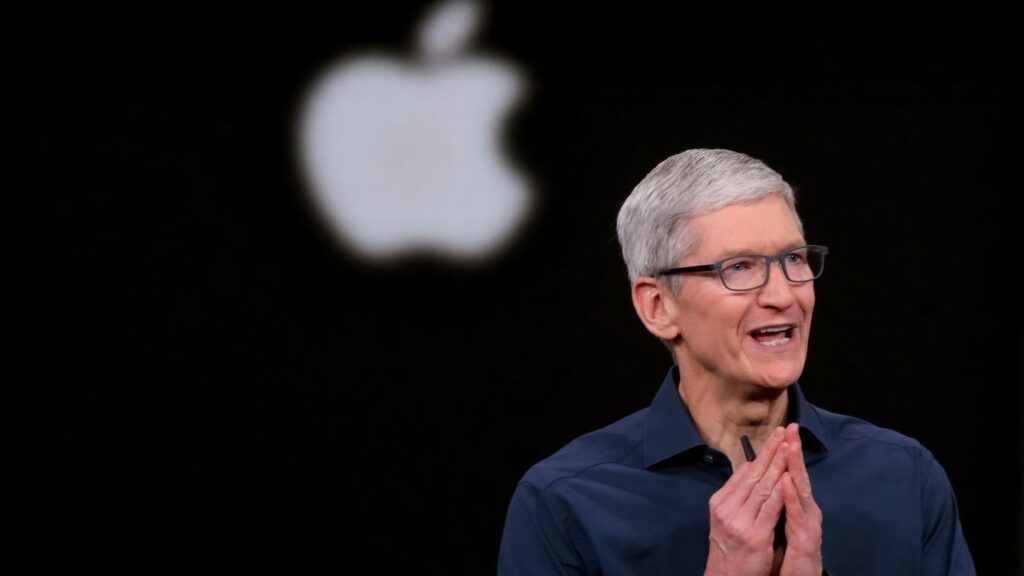Topline
Stock buybacks are all the rage right now, highlighted by Apple’s record program announced last week, as public companies pile in nearly $1 trillion worth of buybacks amid the big-tech boom.
Meet Apple CEO Tim Cook, the king of stock buybacks.
MediaNews Group via Getty Images
Key Facts
Stock buybacks, also known as share repurchases, are when public companies take profits and/or excess cash to acquire their own shares, often off of the open market, and then cancel the freshly purchased stock.
Companies execute the repurchases to theoretically increase the inherent value of outstanding shares and improve its performance per share metrics, and buybacks are one of the two most common ways for firms to reward shareholders for strong profits, the other being dividends, which are quarterly cash payments distributed on a per share basis.
Strong-performing companies typically favor either repurchases, which crucially pose a non-tax event for shareholders and provide a long-term boost to relative valuations, or dividends, which directly line investors’ pockets and are most commonly associated with utility stocks, whose stable demand consistently rewards investors with disbursals.
Though it’s not an either-or proposition to offer dividends or buybacks, the allure of dividends has waned as the volume of buybacks has skyrocketed: The S&P 500’s 1.4% average dividend yield, which compares annual dividend payments to companies’ share prices, is about 30% less than it was five years ago, while Goldman Sachs forecasts a whopping $925 billion worth of repurchases from S&P firms this year, which is 23% higher than 2019’s buybacks and more than 60% higher than 2014’s sum.
It’s actually the massive technology companies, long known for the lack of capital return they offered investors, driving this buyback boom, with Goldman strategists led by David Kostin noting the “magnificent seven” group of American tech giants returned its lowest proportion of profits via repurchases last year since 2017, though the septet still accounted for a whopping 26% of all buybacks among S&P firms.
Apple’s $110 billion authorization, which could theoretically knock off about 4% of the $2.8 trillion iPhone maker’s outstanding shares, offered a glimmer of hope for capital-hungry investors, who also enjoyed magnificent seven members Meta and Alphabet’s first-ever quarterly dividend payments, announced during the first half of 2024.
Get Forbes Breaking News Text Alerts: We’re launching text message alerts so you’ll always know the biggest stories shaping the day’s headlines. Text “Alerts” to (201) 335-0739 or sign up here.
Why Do Companies Do Stock Buybacks Instead Of Paying Dividends?
First of all, companies are not actually required to return capital to investors in any capacity, but management often dangles the carrot to keep shareholders at ease or to attract future buyers. Tech companies historically allocate a smaller percentage of profits toward such endeavors, as they typically reinvest a higher portion of leftover cash to capital-intensive research and development projects, such as artificial intelligence. But as the valuations and earnings soar among all the magnificent seven companies other than Tesla—Google parent Alphabet, Amazon, Apple, Microsoft, Facebook parent Meta and Nvidia are the other six—and the companies grow older, it becomes harder to avoid shelling out higher dividends and/or increasing buybacks. Share repurchases can only go so far, considering there’s a finite amount of stock to even buy, meaning dividends may be in the cards if the war path of big tech’s steady cash generation continues. Alphabet, Apple, Microsoft, Meta and Nvidia all have dividend yields of below 1%, while Amazon has yet to institute a dividend. The $1 trillion firms may tilt their shareholder reward programs away from buybacks and toward dividends as “their cash flows become increasingly stable and the companies seek to expand their investor bases,” prognosticated Kostin.
Big Number
$1.1 trillion. That’s how much Goldman forecasts S&P companies will allocate to share repurchases in 2025. That’s roughly equivalent to the annual gross domestic product of the Netherlands.
Contra
Among the most common criticisms of stock buybacks are that they slow companies from reinvesting into daily operations and thus adding further value to shareholders and the economy. They also can rely on an imperfect science of increasing investors’ holdings, as a subsequent drop in the repurchasers’ share price could erase the potential cash coup scored by investors had there instead been a dividend. They also generate little tax revenue.
Tangent
President Joe Biden instituted a 1% corporate repurchasing tax last year and proposed increasing that to 4%, with Biden declaring at 2023’s State of the Union address that buybacks unduly reward CEOs and shareholders as part of the “loopholes that allow the very wealthy to avoid paying their taxes.” Among the sharpest critics of Biden’s tax is Berkshire Hathaway’s billionaire CEO Warren Buffett, who wrote last year, “When you are told that all repurchases are harmful to shareholders or to the country, or particularly beneficial to CEOs, you are listening to either an economic illiterate or a silver-tongued demagogue.” Berkshire famously does not pay dividends due to Buffett’s belief he can better allocate the capital, and its cash pile popped to a record $189 billion last quarter.
Follow me on Twitter or LinkedIn. Send me a secure tip.
>>> Read full article>>>
Copyright for syndicated content belongs to the linked Source : Forbes – https://www.forbes.com/sites/dereksaul/2024/05/09/what-are-stock-buybacks-the-apple-led-strategy-is-expected-to-swell-to-1-trillion-by-2025/
